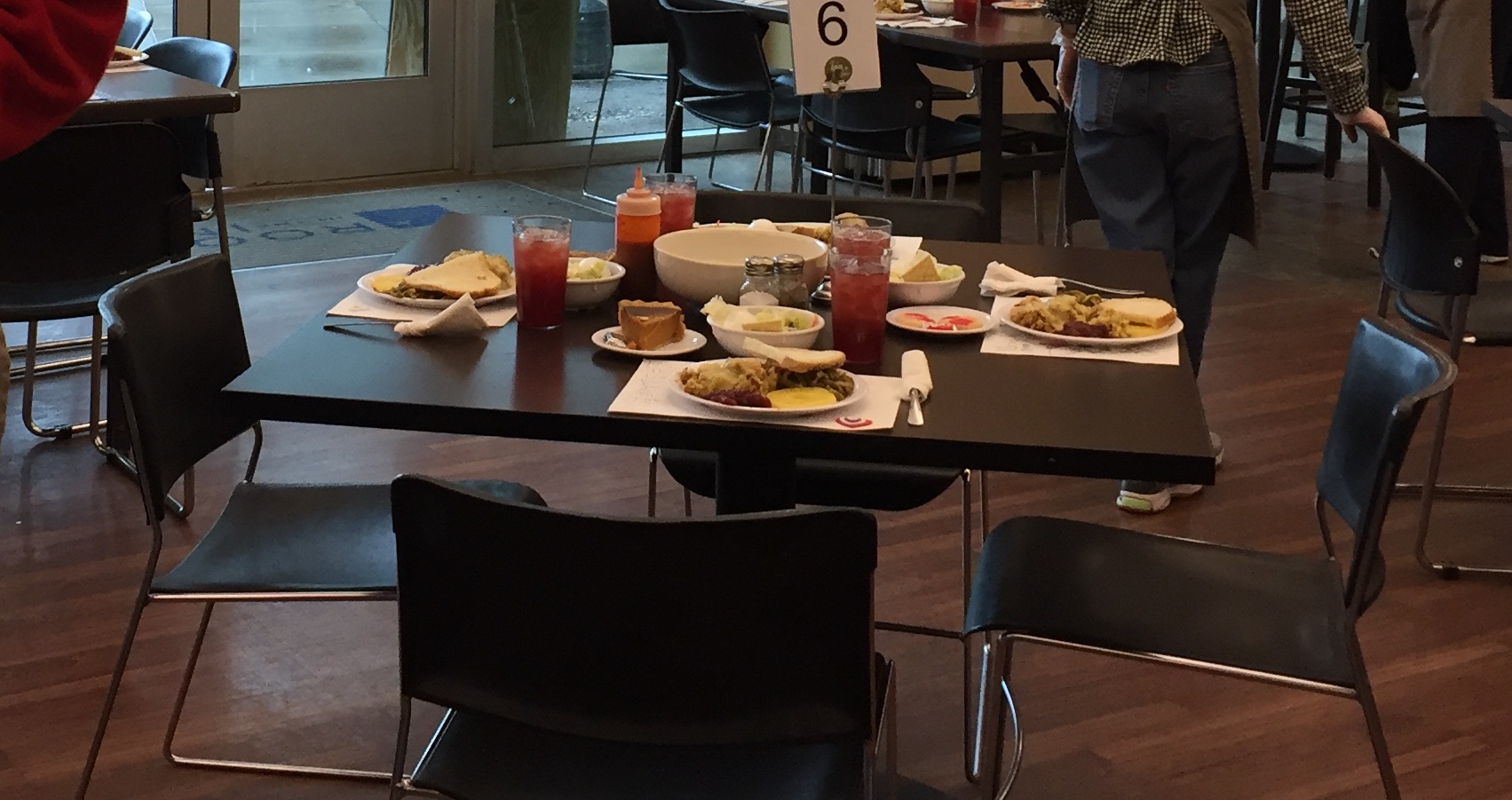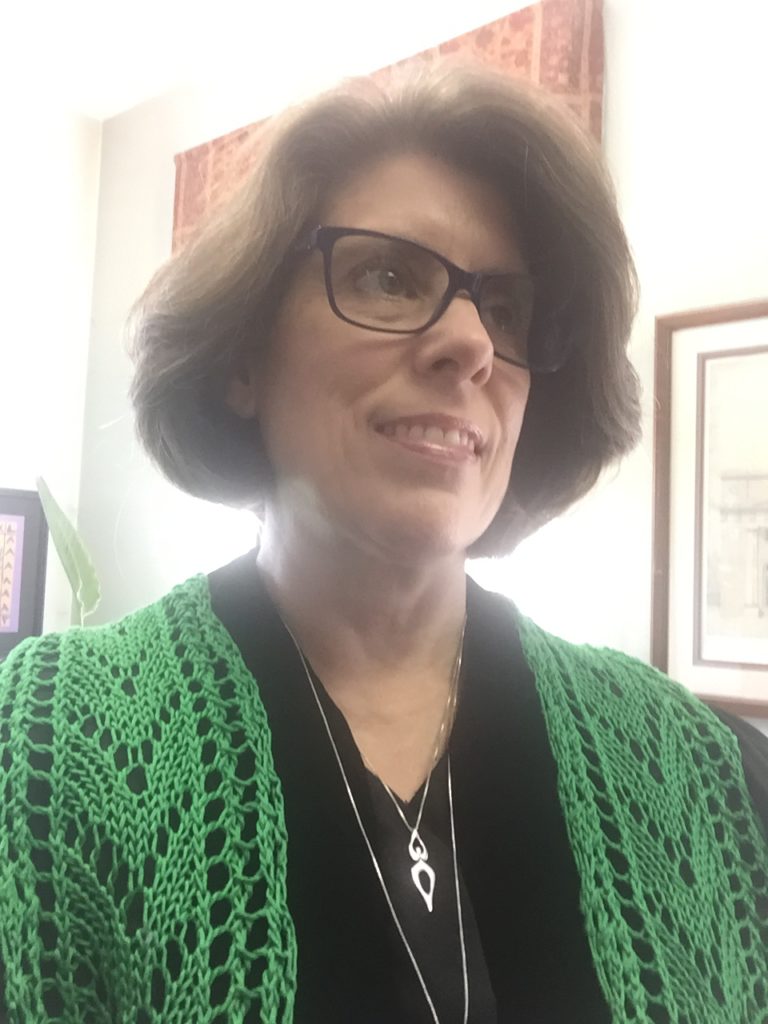
Almost simultaneously this summer I was invited to preach at three churches. My home church, Glendale Baptist would be first, and we spent the summer exploring the Beatitudes. So I took Matthew 5:6, “Blessed are those who hunger and thirst for righteousness, for they will be filled.” I wanted to write a sermon that would travel well… to each of the other churches. As it was coming together, I attended PassportKids Camp where the story of the little girl who played a role in the healing of Naaman was a focus of lessons about love, justice and walking humbly with God. That story really captured my imagination. The choices were fruitful and when this past weekend’s events erupted in Charlottesville, Virginia, I felt gratitude for the Spirit’s push – this summer, and for many years now, to keep working at dismantling racism and and holding up the mirror white privilege.
For a printable copy of the sermon, visit HERE.
To hear a podcast, visit HERE.
++++++++++++++
HANGRY
II Kings 5:1-14 and Matthew 5:6 (1-12)
How many of you have ever been HANGRY?
You know. That feeling where your stomach is growling and maybe your head is starting to hurt? Things around you don’t seem to be going all that well… because you are both both HUNGRY and ANGRY at the same time? HANGRY!
It’s not fun! Right? You need something to satisfy your hunger and chase away the anger, to quench your appetite and soothe your soul.
On a sweltery Tuesday earlier this summer I was serving lunch at Luke 14:12, a feeding ministry in downtown Nashville, when I approached one of my tables of four guests and asked, “Does anyone need water? It’s hot outside. We are pushing water today.” A couple of the men said yes, they would take some water. When I returned I said, “We want to get you all plenty of food and water. We can’t have people running around out there being Hangry!”
They laughed! And one man in a purple T-shirt and a big grin said, “Oh, no ma’am! We can’t have that!”
Luke 14:12 serves a hot lunch three days a week in the dining facility at Room in the Inn, which is a day shelter. My congregation, Glendale Baptist Church partners with Luke 14:12 year round, sending volunteers on the second Tuesday of each month. We also partner with Room in the Inn. From November to March we serve up shelter, beds, and three meals for 10 men – every other Friday night.
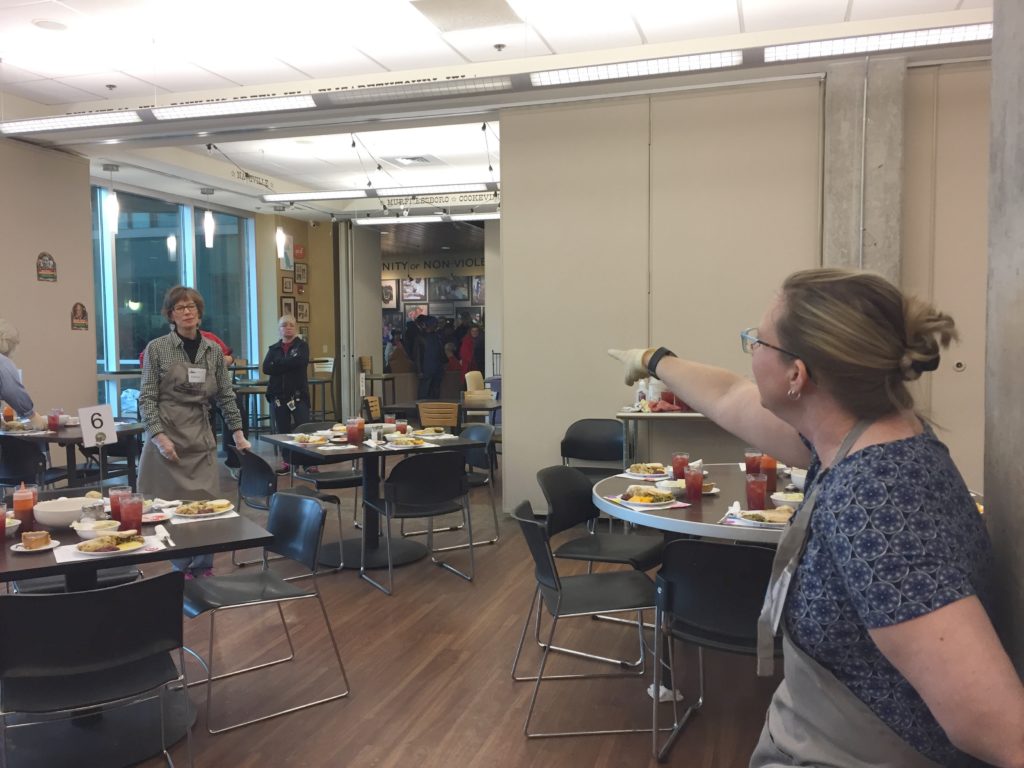
The folks who come for lunch at Luke 14:12 are often homeless and among the working poor. The first shift of diners consists of men and women who live in the transitional housing of Room in the Inn. Most of the other 175 or 200 people who join us have very temporary or fleeting places to live. Many are day laborers. A number are first generation immigrants. Some suffer mental and physical health challenges. Others are riddled with addictions. These folks have more than a few reasons to arrive at the lunch table feeling hangry.
I think it’s fair to say, most of them simply want to good meal in the middle of the day: something to satisfy their hunger and chase away the anger, to quench the appetite and soothe the soul.
Near the end of the lunch hour, as the crowd thins, I sat down to visit with one of the guests, as I often do. I’ll call him James. I sat down to listen because I think people are also hungry for more than food. And thirsty for more than water. They also come hungry and thirsty for conversation and for somebody to listen to their stories.
As I chat with James, an African-American man, probably old enough to be my dad, he starts by telling me he is the slowest eater in the world, and that his brother won’t even go out to a restaurant with him because he eats so slowly. He’s being good-natured about this and we are chuckling. And he had been sitting there for quite some time. I agreed with him: “Well, I think eating slowly is so much better for your health … really tasting the food and taking time to digest it and not just rushing through the meal.”
Then he starts telling me about his appointments. He needs to see a doctor over at County General hospital. He already stopped by mental health. Today he is not working because he had all these appointments. I asked him, “Where do you work?” He said, “I come over here to Room in the Inn and stand out front. You know? When the contractors and construction people come by, I go with them. I’ll do any kind of work, all kinds of work.”
“Well,” I say, “it must be hard to work when you have all these appointments. Do you try to get them on the same day each month?”
“Oh no,” he says, “I take them whenever they say I should be there. And right now I’m trying to find a new apartment and a place to live.”
“Oh?” I ask
“Yes,” he says, “I’ve been staying with my relative who has Alzheimer’s – down in Mississippi. I went and stayed there for about ten months and looked after him but I needed to come back here because Tennessee is where my benefits are.”
As I listen to his story about finding a place to live, I’m pulled up short. I think: yeah when was the last time I gave up life as I know it to go live with someone who needed me to care for them for 10 months? Hum.
For just a moment I see a kind of freedom that living near the margins allows him, a freedom to say yes to choices that many of us who are in trapped by our houses and our mortgages and in our cars and our careers simply do not allow ourselves.
As a person who is privileged and white I am burdened with a lot of things. And my desires and hungers are shaped every day into an appetite for more: more things, more space, more freedom, more choices, more power. There is little in my life that cultivates an everyday hunger or thirst for more righteousness, more justice, more meekness or more simplicity. These are the things Jesus says matter in his Sermon on the Mount. In the Beatitudes – and the whole gospel of Matthew – the idea of righteousness has center stage. And what is righteousness? It is both simple and complex: it’s doing and saying the God-things. Scholars have been debating for years:
Is this righteousness is a gift from God to humanity?
Or is it a demand by God on humanity?
In my brief encounter with James as he sits and eats slowly and tells me about caring for his relative in need, I see righteousness in him as a gift from God. He is able to see and choose the loving, just and God-like thing to do in such a way that it sounds so obvious to him, so easy – a gift. He may be slow at the table, but his deeper hunger and thirst for righteousness and compassion for doing the God-thing, seemed intuitive for him, second nature. His story sparks in me a deeper hunger for justice and righteousness.
Going to Luke 14:12 disrupts my appetites to always have more and more. It brings together my anger and sadness about the ongoing injustices that shape the lives of folks living on the streets, with my hunger for making change. It puts hanger in the pit of my stomach.
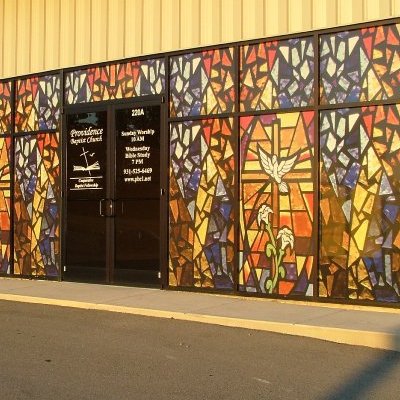
A couple of weeks ago, I asked my friends on Facebook this question, When you are feeling HANGRY what takes the edge off? Interestingly, everyone who replied named food. From almonds and cheese to cookies and pie and milkshakes.
But taking the edge off the deeper hunger for righteousness and thirst for justice. That’s a different story.
So I want to tell you a different story: the story of Naaman.
Ahhh, Naaman. He was a very pleasant guy. In fact his name means “pleasant.” He was rarely ever hangry. He had all he needed to eat and drink, and to satisfy his many appetites. Yet, when he got hangry, watch out!
Naaman is the commander of King Ben-Hadad Junior’s army. Over in Aram? Part of the Syrian Empire. Well, Naaman, he’s a standup guy. He is large and in charge. He’s a great man and highly regarded. He gets excellent feedback and high marks from his 360-degree evaluations every year. Naaman is blessed by God with victory; he is a winner and on top of the world. Except for one small problem. Naaman has a skin disease.
Now Naaman had a servant… Well, he has lots of servants who clean his house, mow his yard, sweep the sand out of the tents. They brush down his horses. They change the oil in his chariots and water the camels. On that last raid over into Samaria and Israel? He even picked up a servant for his wife. You know, a personal assistant. All the wives have one now. And I mean. Haven’t you always wanted a personal assistant?
This particular servant, well, she is a little talkative and Naaman prefers servants to be seen and not heard. Or for that matter neither seen nor heard. But this little girl … well, she had things to say.
In fact over in the servant’s quarters at night, after Commander Naaman’s family is asleep, little Na-a-r?h[1] is right in the thick of things. Here is what I imagine it sounds like when everyone is talking at once.
“Have you seen the master’s skin disease?”
“Seen it? I have to bathe him once a week! I have seen more of it than I care to talk about.”
“It could be catching… you’d better be careful!”
“Does it come from sinning? Ooooh I wonder what he has done! Hum. Mmm.”
“Maybe captured a bunch of people and dragged them away from their homes to wash his skin diseased backside every week?”
“Ooooh girl. Mmmm. Mmmm.”
“Watch out!”
“Should somebody tell him about Elisha?”
“I know that Elisha, of all the prophets in our homeland, could heal Commander Happiness of his skin disease, but would he allow it?”
“I don’t know. He’s works for the Empire.”
“Yeah, and Elisha is a prophet for the Resistance. The commander will never go for that!”
“Shhh. Not so loud. If Commander Happiness hears us talking about his skin disease, he will turn into Captain Grouchy-Pants.”
“l’ll tell him.” Said a small voice into the din of conversation.
“Oh no, you won’t!” said a big voice that was her mother.
“But, but, but… it might be good for all of us…” said the small voice
“That is no reason to get yourself in trouble and speak out of place.” Said her mother.
“But it would be so much better if he was completely well of his skin disease. Then he could be Commander Happiness all the time, instead of Captain Grouchy-Pants.”
“You can’t put yourself in such danger, my dear.” Said Na-a-r?h’s mother
“You know? It might make my Mistress into Mrs. Happiness! Could make all our lives better.”
But said another voice, Commander Naaman is a devoted servant of King Ben-haddad. He’s practically a chaplain to the empire for all the favor that God has sent his way.”
“Oh but please, let me try!” said Na-a-r?h. “I know my mistress will listen to me.”
“NO, and that is final Ray!” said her mother.
But it was not final.
The next day little Ray found a moment to speak to her mistress. She just spit it right out:
“There is a prophet in Samaria who can heal Commander Naaman.”
“What?” said Mrs. Happiness. “A prophet of the Resistance? You must be kidding?”
“No. No. I’ve seen him heal. When we lived there still. The stories were everywhere about his powers. His power comes from God. He can cure Commander Naaman of his skin disease.”
Well, it worked. The Mistress decided that Na-a-r?h might be on to something. What was there to lose? So She told Naaman. And Naaman told the King. And King Ben-Hadad said “By all means, GO!” And he dictated a letter of introduction to King Joram of Israel.[2] And they put together a résumé to die for. But WAIT. In fact a lot of people did die for Commander Naaman’s resume. Hum.
And just in case the résumé and the letter of introduction were not enough, Naaman packed up some of the finest gifts you can imagine – 750 pounds of silver, 150 pounds of gold and 10 drop-dead gorgeous outfits[3] – and loaded them on chariots and donkeys and camels and the backs of his servant-slaves. And Commander Happiness set off to the west and south to visit Samaria, the land of the Resistance.
And despite being burdened with the weight of silver, gold and all those robes and outfits, the servants were surely – if secretly – excited to be on this journey – they were going to their HOMELand.
Now when they arrived at the court of King Joram in Israel, he read the letter from King Ben-Hadad, which said, from one king to another, ““When this letter reaches you, please know that I have sent to you my servant Naaman, AND that you may cure him of his leprosy.”
King Joram took one look at that letter. And he took another look at that entourage. And he went into a panic. He started tearing off his own clothes. “Am I God? Can I grant death or life? This king of the empire sends word to me to cure a man of his leprosy? Just look and see how he is trying to pick a fight with me.”
But when the news got around to Elisha that the King Joram had torn his clothes (“What!?”), Elisha sent a message over to the king: “Why have you torn your clothes? Send that Commander Happiness over here to me. He needs to learn that there is a prophet of the Resistance in Israel.”
So Naaman came with his horses and his chariots, and his gold and his silver and his outfits, and all of his servant-slaves. And he pulled up at the Meadow of Dancing. (That’s where Elisha had been living all of his life.) He parked his chariot in front of Elisha’s house. But NO invitation to dine or to visit was forthcoming. Who wanted to feed all those people?
Instead, Elisha instant messaged him. The text said: “Go, wash in the Jordan seven times, and your flesh shall be restored and you shall be clean.”
So Naaman, and all of his people, all of his fancy résumé and letters of recommendation, all of his gold, silver, chariots, servants, and outfits-to-die-for were left out on the door step. No meal. No conversation. Not even a cool cup of water. Just these ridiculous instructions. And in an instant message of all things!
Well. Commander Happiness was no longer happy. He was angry. And with no offers of hospitality or food, he was probably down right HANGRY. So Captain Grumpy-Pants stomped back to his chariot in a mighty huff. And then he began to shout:
“I thought that for me – the commander of the Empire’s army, with a letter from the King, this so-called prophet would at least come outside! And stand here to call the name of the Lord his God. And surely he would at least wave his hand over the spot, so I could be cured of this skin disease!”
“Aren’t my rivers at home in Damascus, better than all the waters of Israel? Could I not wash in them, and be clean?” The sarcasm was running high. And Commander Naaman reared his horses, and turned his chariots around in a cloud of dust and took off in a rage. (And this, by the way, was one of the earliest biblical accounts of road rage.)
But his servants (knowing the power of this Prophet and power of the God in Israel whom Elisha served intimately) decided to take a risk. They were emboldened surely by the bravery of Na-a-r?h, and they rode up beside the commander. They pleaded over the pounding hooves: “Father, Commander, if the prophet had commanded you to do something difficult, would you not have done it?” He slowed down a little. “How much more,” they shouted, “when all he said to you was, ‘Wash, and be clean’?”
Well. That pulled Naaman up short. So he reigned in the horses and changed the direction of his whole entourage. They all went down to the Jordan River, and he immersed himself seven times in the waters.
And lo and behold, the Prophet of the Resistance, had indeed spoken a righteous word from God. Namaan’s anger cooled off in the water, and he became became pleasant again. Commander Happiness looked down and saw his diseased skin was healed. His flesh was restored like that of a young boy, and he was clean. His skin disease was no more.
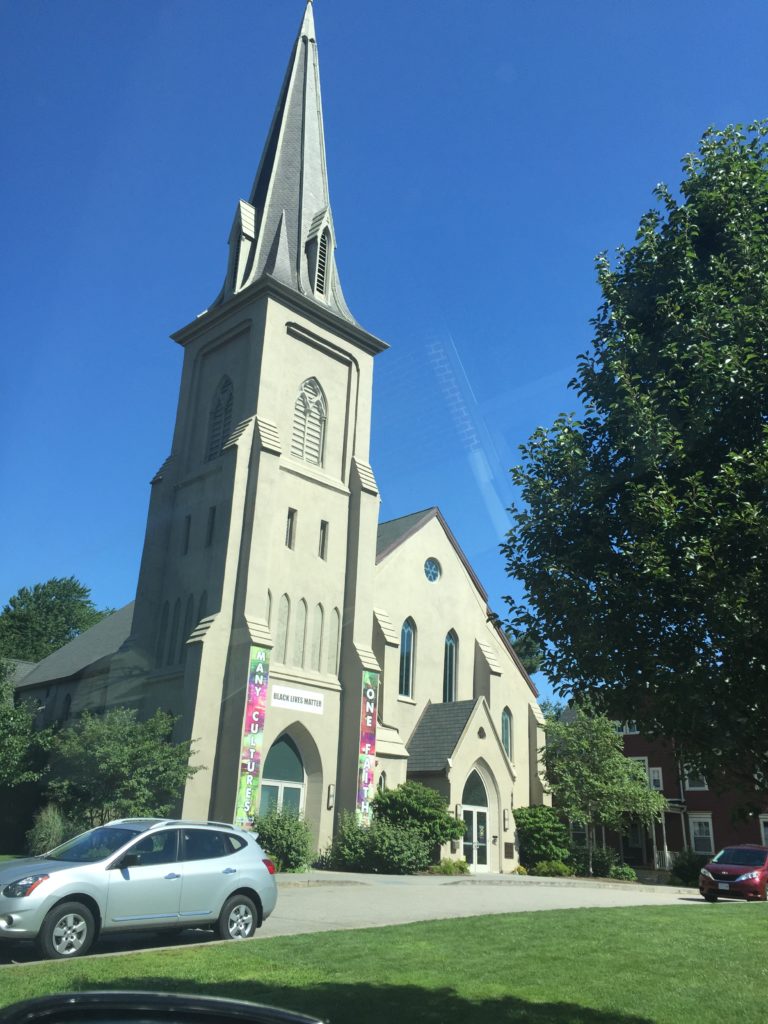
Friends this story pleads with us to listen. It is a parable for our time. Especially after a weekend like we have witnessed in Charlottesville, Virginia. Like Naaman, we are people who have everything going for us: our parking lots are full of chariots. Our bank accounts full of silver. Our closets are full of outfits to die for. Letters of recommendation? Reputations of success? Stories of victory? They are all ours. Compared with the rest of the world, we are on top of the world.
Except for one small problem. Like Naaman, we have a skin disease. We suffer with the skin disease of racism. For those of us who are white, too many of our successes and our resumes are built on the lands of native people, and on the backs of migrant workers and on the suffering of African-Americans whose families were enslaved for centuries in this country. And these are the people who suffer and know the harms of our skin disease, a disease that continues to be visited on each new generation.
When we wake up to these historic and very present realities, and turn ourselves in a new direction, we come face to face with the question: Will you be a chaplain to the empire or will you be a prophet of the resistance?[4] The hidden empire that shapes our desires and our appetites and makes us HANGRY like Naaman is the empire built on white supremacy and privilege.
But prophets for the resistance? They are speaking up all around us. The voice of Na-a-r?h points us to healing. We can hear her voice in the voices of young men and women who are pleading for Black Lives that Matter.
The voice of the unnamed servants in the story say to Naaman, “wash and be clean.” It’s just that simple and that complex. We hear their unnamed voices in those who grow our food and build our houses and clean up after us. They are saying, “We are not illegal. We are human.” It is just that simple and just that complex.
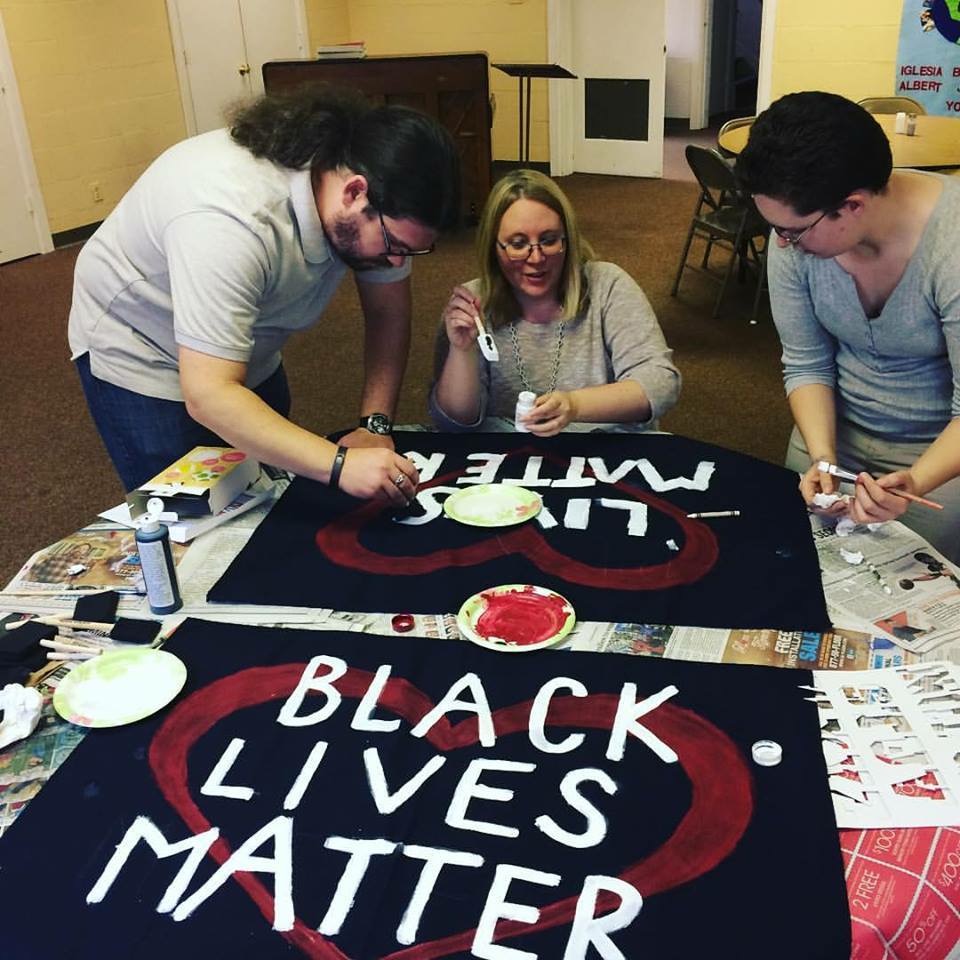
The word of God is speaking to us from prophets like Elisha telling us how to be restored, how to wash and be clean. We can hear bold prophets of Resistance in the voices and the stories of people like Bree Newsome who climbed up and took down the confederate flag. And Rev. William Barbour II who is reviving the poor people’s campaign. And in the voices of hundreds of clergy who linked arms this weekend in the streets of Charlottesville to sing and pray and resist white nationalism and white supremacy. And in the quiet voices and stories of people like James, who sat with me at the table at Luke 14:12. They are calling us to repentance all around us…
But our pride and our power and our rage keep us from true repentance or conversion. We are hangry for the wrong reasons. And for the wrong things. We want to be welcomed, recognized, and honored and invited in for a drink. But that is not necessarily the pathway to healing. Only turning around in repentance and washing ourselves repeatedly will make us clean. God’s righteousness is just that simple and just that complex – both a gift and a demand to do the God-things. To let go of all the grandeur and privilege of our lives and follow the prophets of resistance into the waters of healing.
Only this righteousness can truly satisfy our hungers and chase away the anger, and quench our appetites and sooth our souls.
[1] From Strong’s Concordance: the Hebrew, na·‘a·r?h is translated as a “maid” a “little girl” or a “virgin.”
[2] For the names of the kings see: https://en.wikipedia.org/wiki/Naaman
[3] The converted figures come from the NIV on Bible Gateway.
[4] Thank you to Rev. Michael-Ray Matthews for this question, which he also explores in the new book Trouble the Water: A Christian Resource for the Work of Racial Justice.

